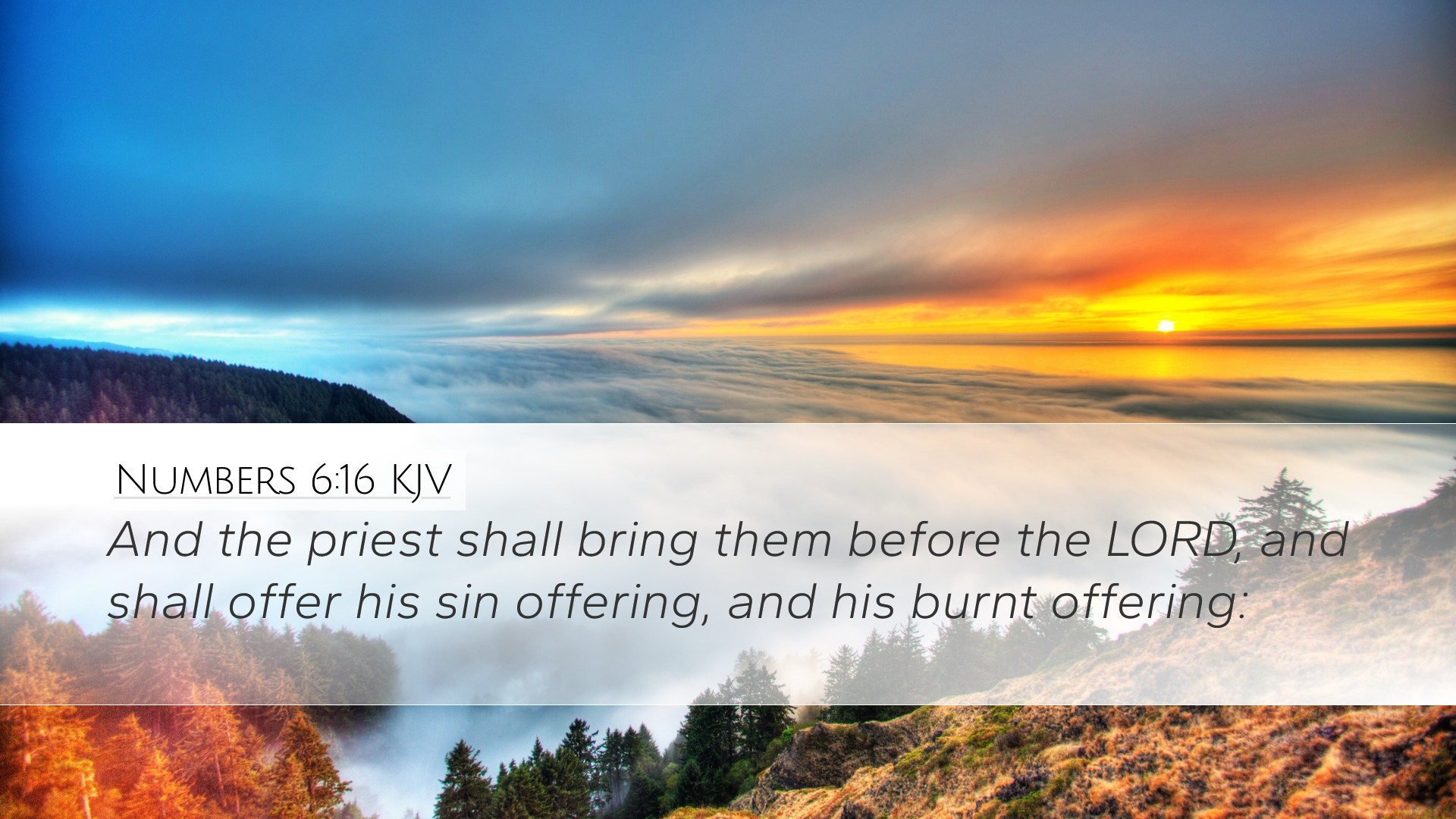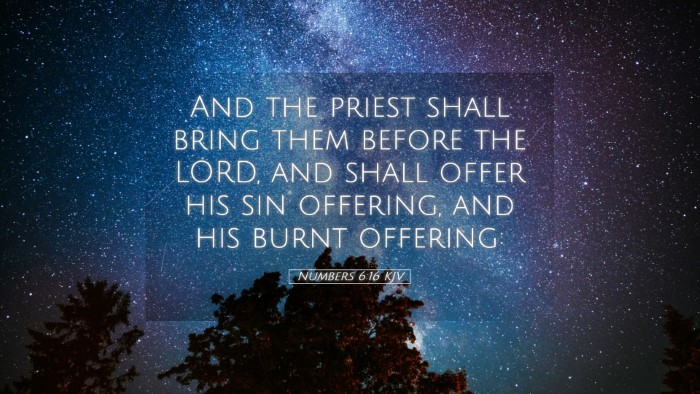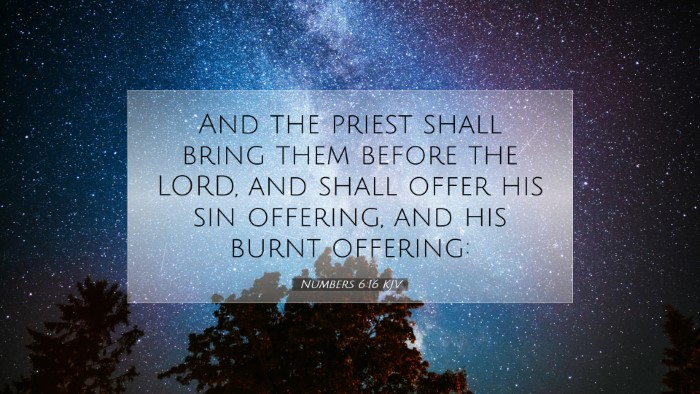Commentary on Numbers 6:16
Bible Verse: "And the priest shall bring them before the Lord, and shall offer his sin offering, and his burnt offering." (Numbers 6:16)
Introduction
This verse is part of the Nazarite vow described in Numbers 6, which provides instructions on how individuals could dedicate themselves to the Lord for a specific period. The verse highlights the role of the priest in mediating between God and the people, especially concerning the offerings that are made.
Context and Background
The book of Numbers is rich in details about the lives of the Israelites during their wilderness wanderings. It outlines the organization of the camp, the duties of the Levites, and various laws governing community conduct and worship. The Nazarite vow itself was a special commitment involving abstaining from wine, not cutting hair, and avoiding contact with the dead. This period of devotion culminated in specific offerings commanded by God.
Commentary Insights
This commentary draws from the public domain works of respected theologians such as Matthew Henry, Albert Barnes, and Adam Clarke to provide a comprehensive understanding of Numbers 6:16.
Matthew Henry’s Commentary
Matthew Henry emphasizes the significance of the priest's role in this verse, noting that the priest brings the offerings before the Lord. This act of presenting offerings signifies the acknowledgment of God's holiness and the need for atonement. Henry explains:
- Mediation: The priest acts as a mediator, bridging the gap between the worshiper and God. This reinforces the necessity of priests in the Old Testament for offering sacrifices.
- Recognition of Sin: The sin offering implies a recognition of human imperfection and the continuous need for reconciliation with God. It is essential for believers to approach God with a conscious awareness of their sins.
- Holiness of Worship: The offerings were not merely rituals; they represented a person's dedication, the seriousness of their vows, and their desire to be in divine favor.
Albert Barnes’ Notes
Albert Barnes provides additional insights, particularly focusing on the structure of the Nazarite's offerings. He states:
- Sequence of Offerings: Barnes points out that the sin offering precedes the burnt offering, highlighting the importance of atonement before presenting an offering of dedication to God. This sequence reflects the order of approaching God: first addressing sin, then expressing devotion.
- Symbolism of Offerings: The sin offering symbolizes the need for cleansing and forgiveness, while the burnt offering symbolizes the complete surrender of oneself to God. Each offering serves a specific purpose in the life of a Nazarite.
Adam Clarke’s Commentary
Adam Clarke examines the theological implications behind the priest’s actions in Numbers 6:16. He asserts:
- Divine Instruction: Clarke emphasizes that the offerings are not arbitrary; they are divinely instituted. The ritual signifies the order God desires in worship, which points to the broader narrative of Israel's covenant relationship with God.
- Role of the Priesthood: Clarke elaborates on the importance of the priestly office, noting that the priests held a vital role in maintaining the spiritual health of Israel and were essential for facilitating the people’s relationship with God.
- Foreshadowing Christ: The act of making sin offerings and burnt offerings can be seen as a foreshadowing of the ultimate sacrifice Jesus Christ would make for humanity—a theme that resonates throughout the New Testament.
Theological Implications
The implications of Numbers 6:16 reach far beyond the ritual context. It underscores themes such as:
- The Necessity of Atonement: The importance of atonement is prevalent throughout Scripture. The practice of offering sacrifices for sin points to humanity's need for grace, emphasizing that one cannot approach God without acknowledging their unworthiness.
- Intercession of the Priest: Just as the priest interceded for the Nazarite, Christ intercedes for believers today (Hebrews 7:25). This verse serves as a reminder of our need for intercession as we strive to live holy lives.
- Fulfillment in Christ: The Nazarite vow, and its accompanying offerings, leads us to a greater understanding of obedience, sacrifice, and dedication—elements fully realized in the life and work of Jesus Christ.
Application for Today
For pastors, students, theologians, and Bible scholars, Numbers 6:16 provides rich material for reflection and application:
- Understanding Vows: Recognize the significance of making commitments to God and the faithfulness required to uphold those vows in our spiritual journeys.
- Role of the Church: Just as priests had a communal role in the Old Testament, contemporary church leaders and believers are called to mediate grace, fostering communal worship and intercession for one another.
- Holiness in Worship: Cultivate a sense of reverence in approaching God, understanding that worship is not just about ritual but about the heart's condition and acknowledgment of divine holiness.
- Grace of Atonement: Reflect on the grace provided through Christ, who fulfills the requirements for atonement and brings believers into a new covenant relationship with God.
Conclusion
Numbers 6:16 serves as a vital reminder of God’s holiness and the necessity of atonement in the lives of His people. By examining the insights from Matthew Henry, Albert Barnes, and Adam Clarke, we can appreciate the depth of this verse and its implications for both ancient Israel and today's believers. The sacrificial system, while fulfilled in Christ, teaches enduring truths about our relationship with God and the call to holiness in our lives.


